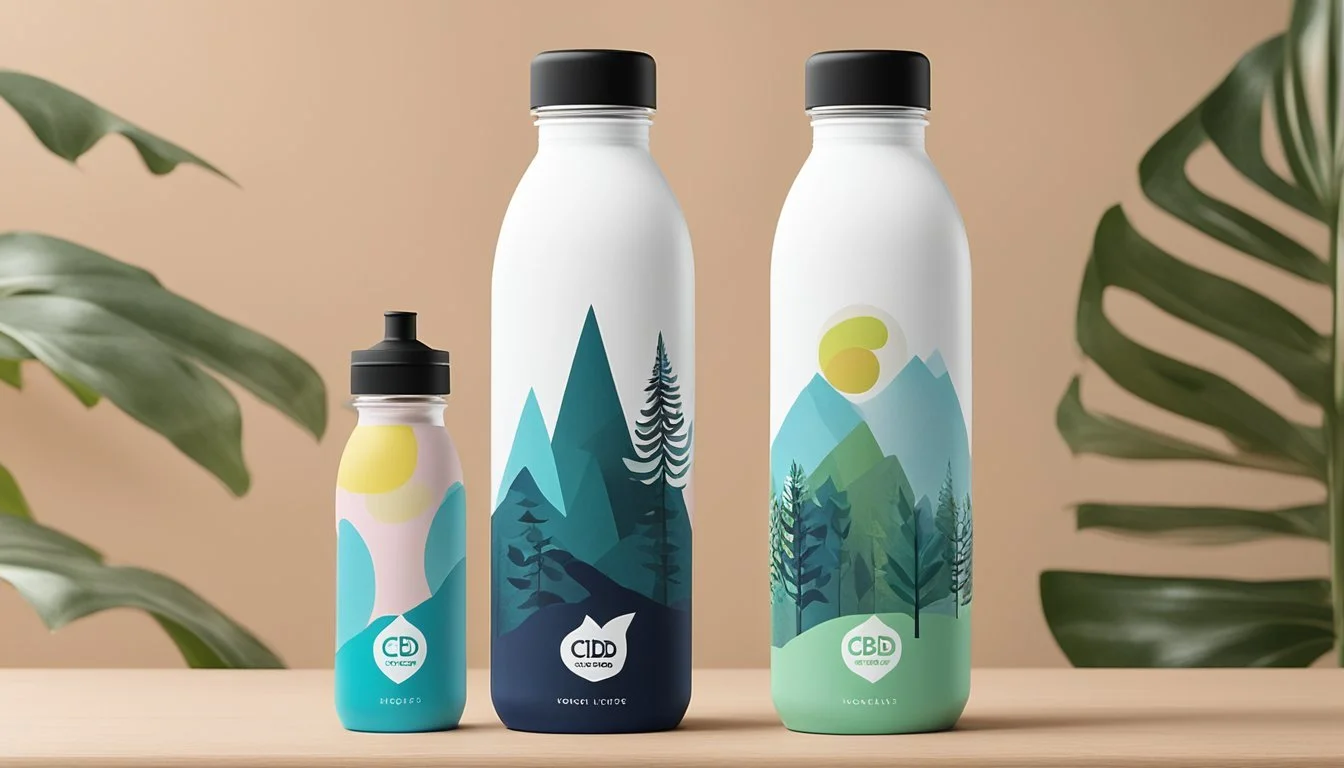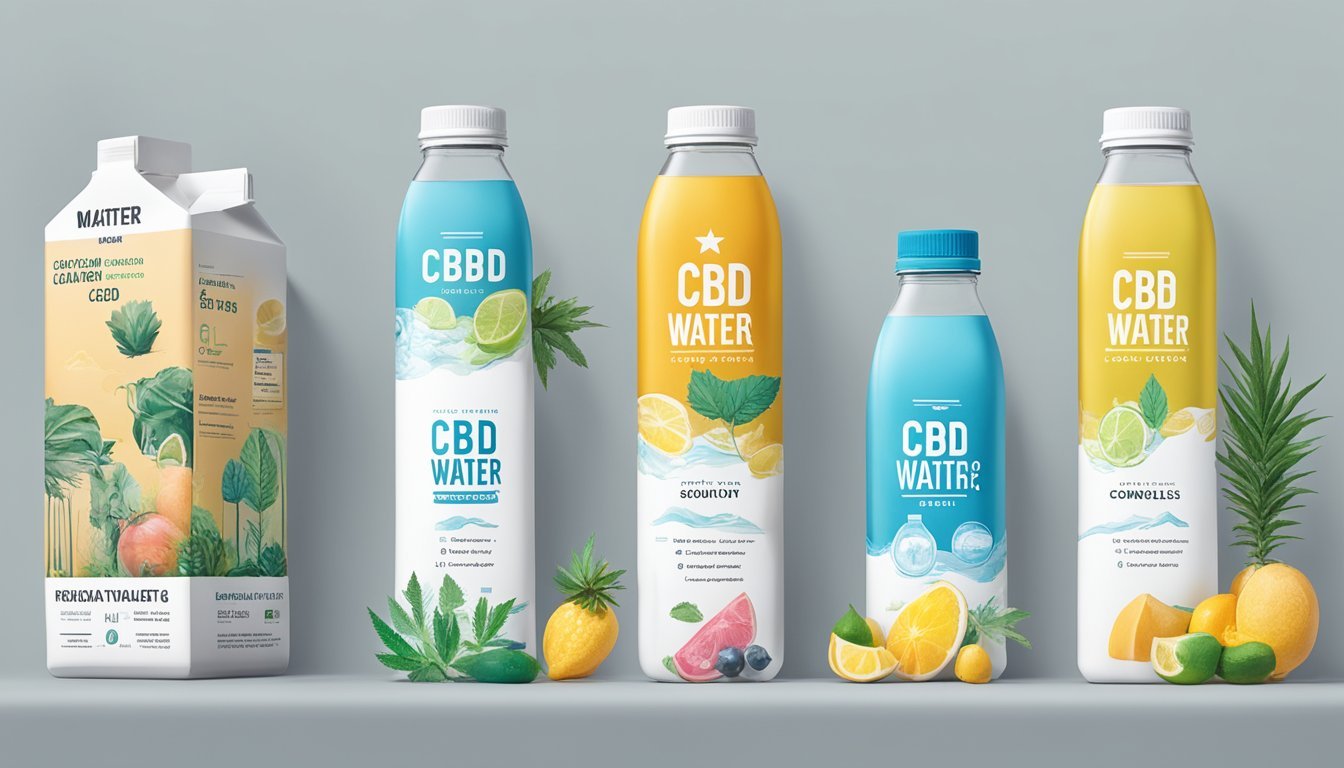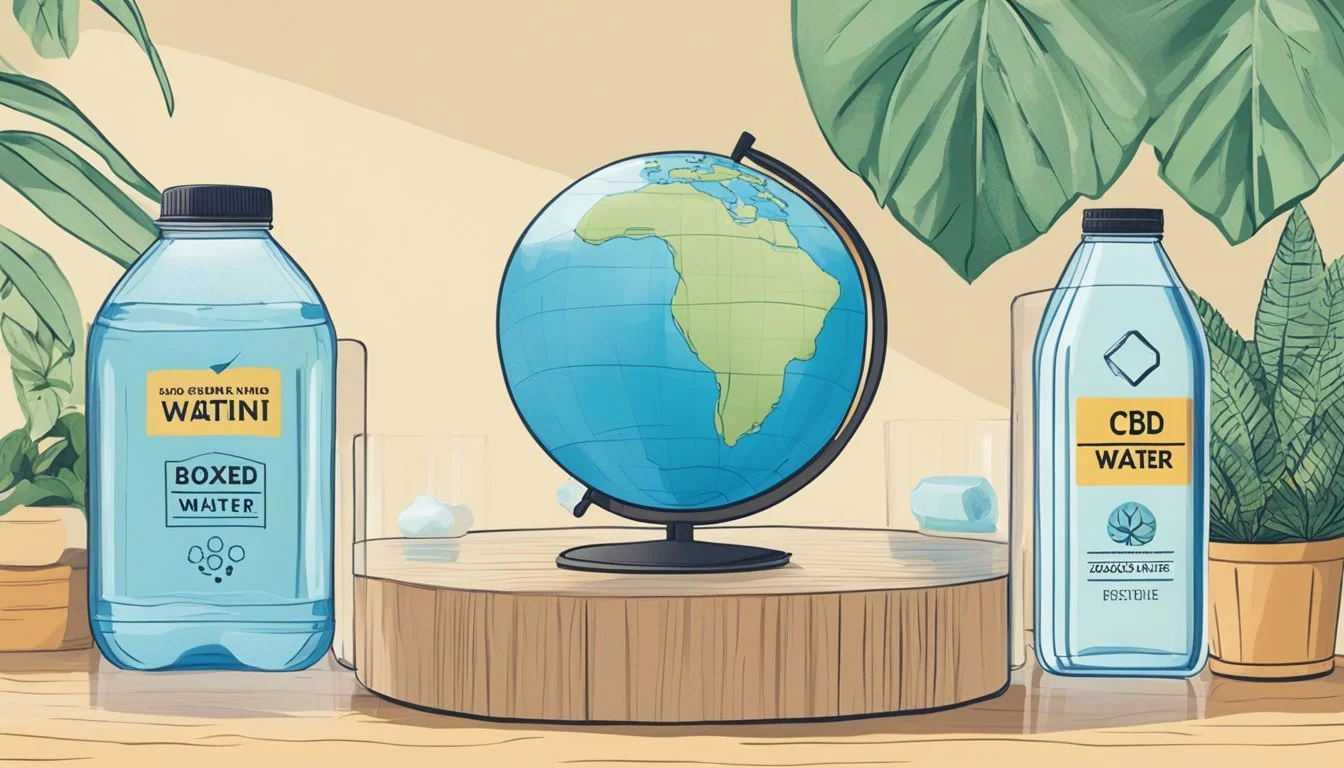Boxed Water vs. CBD Living
Comparing Bottled Water Choices
In recent years, the debate over the best kind of bottled water has intensified, with options ranging from traditional plastic bottles to more innovative solutions like Boxed Water and CBD Living. Consumers are increasingly concerned about environmental impact and health benefits, making the choice more crucial than ever. Between these two options, Boxed Water offers an eco-friendly alternative by using sustainable paper-based packaging, significantly reducing plastic waste.
Boxed Water, which debuted in 2009, disrupted the market by presenting water in a carton primarily made of paper, reducing reliance on plastic and aluminum. This sustainable option tackles key environmental issues, appealing to eco-conscious consumers. Meanwhile, CBD Living goes beyond hydration, infusing bottled water with CBD for potential health benefits, adding a new dimension to the bottled water market.
Choosing between Boxed Water and CBD Living depends on your primary concerns. If environmental impact is your top priority, Boxed Water’s sustainable packaging provides a compelling reason to switch. However, if you're looking for additional wellness benefits, especially related to CBD's possible calming effects, CBD Living might be the better choice.
Understanding Boxed and Bottled Waters
Boxed and bottled waters offer significantly different approaches to packaging and sustainability. They each have unique materials and environmental impacts, providing various benefits and drawbacks to the consumer.
What Is Boxed Water?
Boxed Water, such as the brand Boxed Water Is Better, primarily uses paper-based cartons for packaging. These cartons typically consist of 74 percent paper, 1 percent aluminum, and 25 percent plastic. The paper component is crucial for reducing the use of non-renewable resources.
The inclusion of aluminum and plastic ensures durability and provides necessary waterproofing. Boxed Water is marketed as an eco-friendlier option compared to traditional plastic bottles. The recyclable nature of paper cartons and the reduced carbon footprint from production and transportation are significant selling points for environmentally conscious consumers.
What Is Bottled Water?
Bottled Water refers to water packaged in plastic, glass, or aluminum bottles. The most common type uses plastic bottles, typically made from polyethylene terephthalate (PET). PET bottles, while lightweight and durable, contribute significantly to plastic waste and pollution.
Increasing concerns about plastic waste have led to a growing market for alternatives, including boxed water and other recyclable packaging options. Bottled water remains widely available and popular due to its convenience, affordability, and established distribution networks. High-end variants, such as CBD Living Water, also combine wellness trends with hydration by infusing water with cannabidiol (CBD).
Each type of water packaging has distinct characteristics and impacts, influencing consumer preferences and environmental considerations.
Environmental Considerations
When comparing Boxed Water and CBD Living water, it is essential to focus on their impact on the environment, sustainability efforts in packaging, and how these products manage recycling and waste.
The Impact of Plastic on the Environment
Plastic pollution is a pressing global issue. Single-use plastic bottles contribute significantly to this problem, often ending up in landfills or the ocean. Boxed Water aims to reduce plastic usage by using cartons made from 74% paper, 1% aluminum, and 25% plastic.
CBD Living water bottles, on the other hand, primarily utilize PET plastic, which can contribute to long-lasting environmental pollution. The carbon footprint of producing and transporting plastic bottles is also higher compared to paper-based alternatives.
Sustainability Efforts in Packaging
Boxed Water focuses on packaging derived from sustainable forests. They use mainly paper-based cartons, which are designed to lower the environmental impact. The company ensures that the paper used is sourced from well-managed, renewable forests.
CBD Living has taken steps to offset their carbon footprint by participating in reforestation projects. They have begun exploring more sustainable packaging options, though currently, their usage of PET plastic underscores the need for improved sustainable measures.
Recycling and Waste Management
Recycling plays a critical role in managing waste effectively. Boxed Water cartons can be recycled, though they require specialized facilities due to their mix of materials. Boxed Water promotes reusable bottles, urging consumers to reduce waste.
CBD Living’s PET plastic bottles are widely accepted in recycling programs; however, not all are recycled properly, leading to more waste. They emphasize the importance of correct recycling practices to minimize environmental harm.
Both companies must continue improving their recycling initiatives to enhance environmental sustainability and reduce landfill contributions.
Health and Safety Concerns
When comparing boxed water and CBD Living water, it is crucial to consider potential contaminants and the certifications ensuring the safety of these products. This helps ensure consumers can make informed decisions regarding their hydration options.
Potential Contaminants in Packaged Water
Packaged water can potentially contain contaminants such as BPA, chlorine, and fluoride. BPA, often found in plastic bottles, is a chemical that can leach into water and hormone functions.
CBD Living uses BPA-free bottles, reducing this risk. Boxed Water, with its primarily paper-based cartons, also minimizes BPA exposure. However, contaminants like chlorine and fluoride may still be present depending on the source and purification processes.
Both brands likely utilize filtration methods such as ultraviolet (UV) treatment and other purification techniques to mitigate these risks. UV treatment can effectively neutralize harmful microorganisms, adding an extra layer of safety.
Certifications and Standards for Drinking Water
Certifications and established standards play a significant role in ensuring the safety of drinking water. Both CBD Living and Boxed Water adhere to rigorous standards to guarantee their products are free from harmful substances.
Organizations like the FDA set guidelines for bottled water quality. CBD Living and Boxed Water are both certified to meet these standards, ensuring their water is safe for consumption. Additionally, Boxed Water is committed to sustainability, as indicated by their use of plant-based plastics and 100% recyclable materials.
Regular testing and adherence to quality protocols are critical for maintaining the purity and safety of bottled water, providing consumers with peace of mind.
By understanding the potential contaminants and certifications, consumers can choose the best option for safe, clean hydration.
The Role of Innovation in Water Solutions
In the race to offer better bottled water, companies have focused on sustainability and creative packaging. Such advances reduce environmental impact and cater to growing eco-conscious consumers.
Advancements in Sustainable Materials
One significant innovation in water solutions is the use of sustainable materials. Boxed Water has pioneered the use of carton-based packaging, primarily made from paper, a material that is renewable and offers a lower carbon footprint than traditional plastic bottles. Plant-based plastics have also gained traction, providing biodegradable options that are less harmful to the environment.
In contrast, CBD Living uses bottles, which although convenient, often rely on less eco-friendly materials. Aluminum and glass are alternatives with high recyclability rates, reducing waste and environmental degradation. Stainless steel, known for its durability, also presents a long-lasting solution but is less common in single-use water products.
Alternative Packaging Options
Packaging innovation extends beyond materials. Boxed Water's cartons emphasize recyclability and ease of transport, significantly reducing their carbon footprint. Unlike plastic, these cartons can be converted back into paper products through carton recycling processes.
Aluminum bottles, though energy-intensive to produce, are 100% recyclable and reduce usage of raw materials. Glass bottles offer a clean, inert packaging option that doesn't degrade product quality but are heavier and less convenient for transport. Stainless steel, while primarily used for reusable bottles, showcases the potential for durable, long-term alternatives.
These innovations signify a shift towards more environmentally responsible bottled water solutions, aligning product offerings with sustainable practices.
Comparative Analysis
This section compares the key attributes of Boxed Water and CBD Living, focusing on taste, carbon footprint, and consumer convenience.
Taste and Quality Comparison
Boxed Water emphasizes a crisp and refreshing taste, often attributed to its packaging's ability to maintain freshness. The water is sourced from multiple springs and is purified through a multi-step process, making it quite neutral in flavor.
CBD Living offers a unique twist by infusing their water with CBD. This gives the water a subtle hint of earthy flavor from the CBD. It also boasts a thorough purification process and nanotechnology to improve the bioavailability of CBD.
Carbon Footprint and Life Cycle Assessment (LCA)
Boxed Water's packaging consists mainly of paper (74%) and a small amount of plastic and aluminum. This contributes to a lower carbon footprint than traditional plastic bottles. It boasts 92% plant-based packaging materials sourced from sustainability-certified forests.
CBD Living bottles are similar to conventional plastic bottled water, which often results in higher greenhouse gas emissions throughout their lifecycle. A comprehensive life cycle assessment (LCA) would likely show that Boxed Water has a lower carbon footprint due to its renewable material composition compared to the more traditional plastic formula used by CBD Living.
Convenience and Consumer Habits
Boxed Water leverages a recyclable cardboard carton that is easily portable and has a resealable cap. This design appeals to eco-conscious consumers who prioritize sustainability without sacrificing convenience.
CBD Living, with its focus on delivering the benefits of CBD through water, attracts health-focused and wellness-oriented customers. The traditional plastic bottle format may be chosen for its familiarity and ease of use, aligning with conventional consumer habits despite environmental concerns.
Market Trends and Consumer Behavior
The bottled water market has witnessed significant changes driven by evolving consumer preferences and the beverage industry's commitments to sustainability. These shifts have influenced the competition between Boxed Water and CBD Living in various ways.
Changes in Consumer Preferences
Consumers are increasingly prioritizing sustainable and eco-friendly products.
This trend is evident as more people choose brands that emphasize minimal environmental impact. For instance, Boxed Water has gained attention due to its paper-based cartons, which are perceived as more sustainable than traditional plastic bottles.
Meanwhile, the rise in awareness about health and wellness has driven preferences toward bottled water that offers additional benefits, such as the inclusion of CBD. CBD Living has capitalized on this by offering a product that not only hydrates but also provides potential health benefits associated with CBD.
As a result, consumer behavior is shifting towards brands that meet both sustainability and health criteria.
The Beverage Industry's Green Commitments
Commitments to environmental sustainability have become imperative for companies in the beverage industry.
Brands like Boxed Water have positioned themselves as leaders in this space by opting for renewable packaging materials and focusing on reducing carbon footprints. Many companies are now adopting similar strategies to avoid accusations of greenwashing — a practice where companies falsely promote their products as environmentally friendly.
Efforts include the reduction of plastic usage, investment in recyclable and biodegradable packaging, and transparent reporting on environmental impact. Both Boxed Water and CBD Living aim to align with these trends by ensuring their products not only meet consumer demand but also adhere to green practices.
As environmental consciousness grows, companies that authentically commit to sustainable practices are likely to gain a competitive edge.
Partnerships and Certifications
Boxed Water and CBD Living have distinct approaches toward sustainability through their partnerships and certifications, focusing on environmental stewardship, sustainable practices, and collaborations with key organizations.
Collaborations with Environmental Organizations
Boxed Water actively collaborates with environmental organizations to promote sustainability. They have partnerships with reforestation foundations and world water relief foundations to support global water access and tree planting initiatives. These partnerships underscore Boxed Water's commitment to replenishing natural resources and improving ecosystem health.
CBD Living's collaborations are more focused on health and wellness rather than direct environmental causes. They often partner with research institutions to ensure the quality and efficacy of their products. While not as heavily aligned with environmental organizations as Boxed Water, their partnerships highlight a dedication to product safety and consumer health.
Certified Efforts in Sustainability
Boxed Water holds several certifications that emphasize its sustainable practices. Their cartons are certified by the Forest Stewardship Council (FSC), ensuring they are sourced from well-managed forests. Additionally, the packaging is made from 92% renewable resources, demonstrating their dedication to reducing plastic waste in the environment.
CBD Living focuses on rigorous quality assurance through certifications like the Certificate of Analysis (COA) for purity and potency of their products. While their focus is less on environmental sustainability and more on product integrity, these certifications guarantee that their water meets high standards for health and wellness.
Boxed Water's certifications reflect a strong emphasis on environmental stewardship, while CBD Living's efforts underscore a commitment to product quality and consumer safety.
Community and Global Engagement
Boxed Water and CBD Living both demonstrate commitments to making positive changes in communities and the environment. They focus on investment in global water access and educational initiatives on water stewardship.
Investment in Global Water Access
Boxed Water supports various projects aimed at improving global water access. They collaborate with initiatives like the Ocean Blue Project, contributing to clean water efforts and ocean cleanups. Their cartons, made from mostly plant-based materials, emphasize sustainable practices that help reduce plastic pollution.
CBD Living shares a similar vision for promoting water accessibility across the globe. They contribute a portion of their profits to international water relief efforts. By funding infrastructure projects, they help ensure that communities in need have reliable access to clean drinking water.
Educational Initiatives on Water Stewardship
Boxed Water actively educates the public on water stewardship through partnerships and campaigns. They work with schools and communities to promote the importance of reducing plastic waste and conserving water. Their outreach includes community workshops and informative campaigns targeted at fostering environmental awareness.
CBD Living also values education, focusing on teaching sustainable water practices. They support educational programs that highlight the significance of water conservation. Through their digital channels and community events, they strive to engage audiences in understanding and protecting water resources.
Both companies integrate substantial efforts into their community and global engagement strategies, emphasizing sustainable practices and the long-term health of water ecosystems.
Conclusion
Boxed Water and CBD Living Water both strive to offer a more sustainable alternative to traditional plastic bottled water.
Sustainability efforts are a key aspect of both brands.
Boxed Water uses cartons made primarily from paper, which reduces plastic waste. These cartons contain 74% paper, 1% aluminum, and 25% plastic.
CBD Living Water focuses on wellness by infusing water with CBD, which many consumers find beneficial for their well-being.
Environmental impact is a priority for both companies.
Boxed Water aims to minimize ozone depletion and global warming through its packaging.
CBD Living Water uses recyclable plastic bottles, promoting reusable bottles over single-use options.
In terms of flavor and design, Boxed Water is praised for its crisp taste and fun, milk box-style design.
CBD Living Water offers the added benefit of CBD, appealing to those seeking wellness benefits.
Both products present viable options for consumers concerned with sustainability and health.





